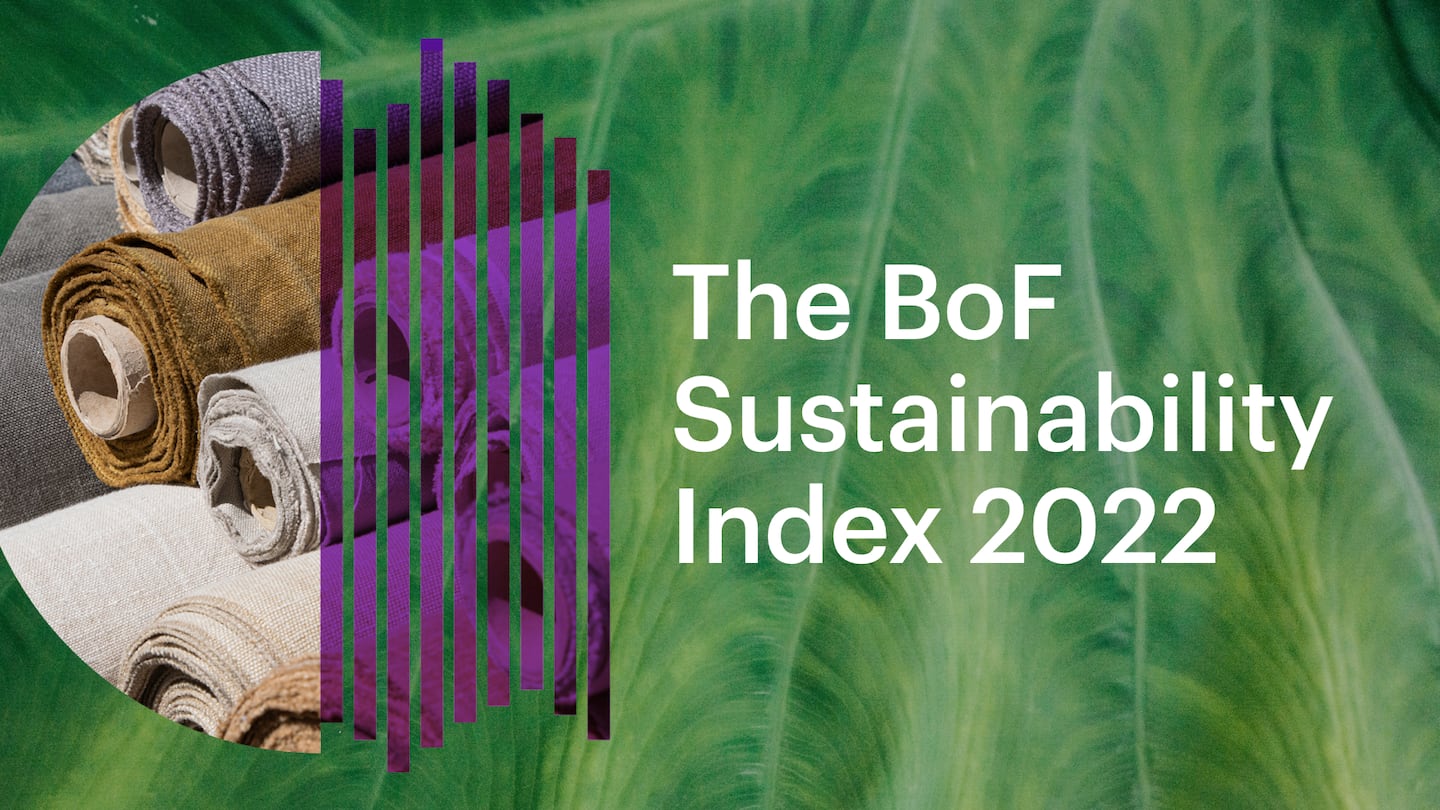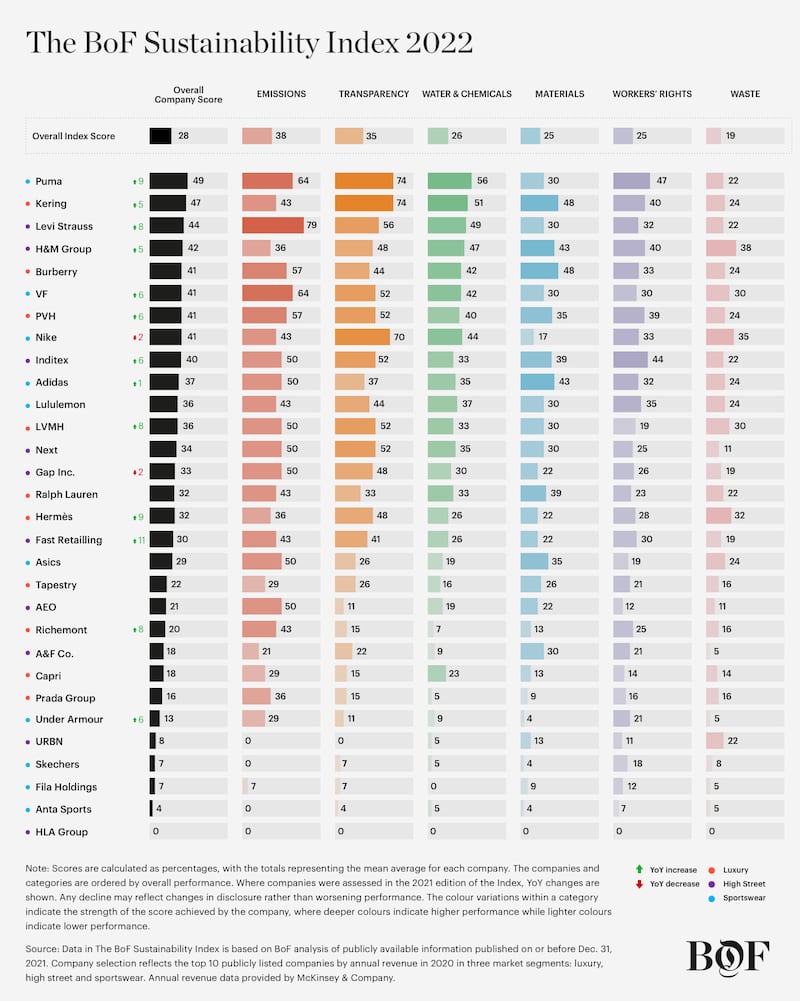The Business of Fashion
Agenda-setting intelligence, analysis and advice for the global fashion community.
Agenda-setting intelligence, analysis and advice for the global fashion community.

The current decade marks a critical inflection point for the fashion industry to transform in line with global ambitions to curb climate change and establish more responsible business practices.
Last year, The Business of Fashion created The BoF Sustainability Index, examining public disclosures from 15 of fashion’s largest players to benchmark the industry’s progress towards achieving ambitious environmental and social targets by 2030. The results demonstrated a substantial gap between major brands’ public commitments and meaningful, measurable actions.
This year, the Index has expanded in scope to examine the performance of the industry’s 30 largest publicly traded companies by revenue across three market segments: luxury, sportswear and high street. Our research team at BoF Insights assessed each company on more than 200 different data points across six impact categories: Transparency, Emissions, Water & Chemicals, Waste, Materials and Workers’ Rights.
With just eight years left to reach targets, the results are stark: performance in five out of six impact categories has worsened as incremental progress among the original cohort of 15 companies assessed last year was eclipsed by inaction across many of the new additions.
ADVERTISEMENT
While technological innovation, policy cues and standardised reporting frameworks are helping to prompt action, limited accountability within the sector, poor-quality data and a lack of investment are holding back real transformative change.
Download the full report from BoF Insights for in-depth analysis of sustainability advances to date, key challenges facing the industry and the landscape for the year ahead.

Transformation, Interrupted
The window for the fashion industry to transform its business practices in line with global sustainability goals is rapidly closing, yet change remains incremental. The biggest players in the original cohort of 15 companies from last year have largely emerged as frontrunners, but they are still moving much too slowly to achieve targets by 2030. Meanwhile, several companies among the new additions have yet to meaningfully engage publicly with issues related to sustainability at all.
Overall, progress remains uneven, opaque and above everything, too slow:
The Index Methodology:
The BoF Sustainability Index examines the 10 biggest public companies by annual revenue in 2020 across three distinct fashion industry verticals: luxury, high street and sportswear. It assesses performance across six impact categories: emissions, transparency, water & chemicals, waste, materials and workers’ rights.
Within those categories, the companies are benchmarked against 16 ambitious environmental and social targets established by The Business of Fashion in consultation with a group of respected global experts. Each of the targets contains a series of binary metrics (201 in total) that were scored “yes” or “no” based on information that was publicly available on or prior to December 31, 2021.
ADVERTISEMENT
Year-on-year, the methodology has been updated and condensed; companies’ 2020 scores have been updated accordingly in this year’s report.
The companies assessed in The BoF Sustainability Index 2022 are: Abercrombie & Fitch Co., Adidas, American Eagle Outfitters, Anta Sports, Asics, Burberry Group, Capri Holdings, Fast Retailing, Fila Holdings Corp., Gap Inc., H&M Group, Hermès, HLA Group Corp., Inditex, Kering, Levi Strauss & Co., Lululemon Athletica, LVMH, Next PLC, Nike Inc., Prada Group, Puma, PVH Corp., Ralph Lauren Corp., Richemont, Skechers USA, Tapestry, Under Armour, Urban Outfitters Inc. and VF Corp.
More information on the methodology is available in our FAQs, or download the report from BoF Insights to review it in full.
BoF Insights is The Business of Fashion’s data and advisory team, partnering with leading fashion and beauty clients to help them grow their brands and businesses. Get in touch at insights@businessoffashion.com to understand how BoF Insights support your company’s growth for the long term.
The BoF Sustainability Index is based on a binary assessment that examines companies’ public disclosures up until Dec. 31, 2021. It should be viewed as a proxy for sustainability performance and not an absolute measure. BoF accepts advertising arrangements from a range of partners, some of which may appear in The Sustainability Index. Such advertising arrangements and the Index are handled by separate parts of the business. LVMH is part of a group of investors who, together, hold a minority interest in The Business of Fashion. All investors have signed shareholders’ documentation guaranteeing BoF’s complete editorial independence.
The industry needs to ditch its reliance on fossil-fuel-based materials like polyester in order to meet climate targets, according to a new report from Textile Exchange.
Cotton linked to environmental and human rights abuses in Brazil is leaking into the supply chains of major fashion brands, a new investigation has found, prompting Zara-owner Inditex to send a scathing rebuke to the industry’s biggest sustainable cotton certifier.
Over the last few years, the run-up to Earth Day has become a marketing frenzy. But a crackdown on greenwashing may be changing the way brands approach their communications strategies.
This week, Sephora announced plans to double down on ‘green’ and ‘clean’ product labels, leaning into an increasingly risky marketing tactic even as a greenwashing crackdown has prompted other brands to pull back.